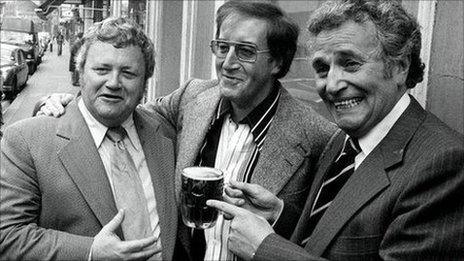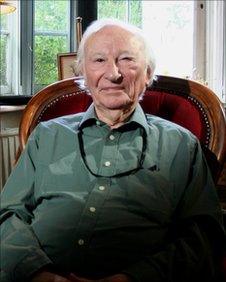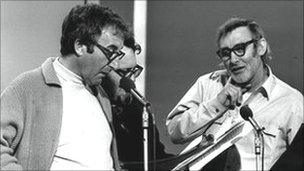Goons producer marks show's 60th anniversary
- Published

Goons Harry Secombe, Peter Sellers and Michael Bentine (l to r) reunited in 1976 to celebrate the show's 25th anniversary
It's 60 years since BBC listeners first discovered The Goons. None of the stars are still alive but producer Charles Chilton can still recall the pleasure and perils of putting Spike Milligan's extraordinary creation on air.
"I'd go back to the BBC now if they asked me," he says in an interview for the BBC World Service Witness programme.
That might seem a ridiculous statement for a man aged 94, but Mr Chilton somehow manages to seem two decades younger than he is.
He joined the BBC in 1933 at the age of 15, working in publications at the newly opened Broadcasting House.
During World War II, he served in the RAF (although the BBC still made up his salary) before returning to work in the radio variety department.
Later, Chilton wrote and produced the 1950s sci-fi classic Journey into Space.
He also worked on the stage hit Oh, What a Lovely War, which was based on one of his own programmes, and he and his wife Penny still get a bit of pocket money each quarter from the amateur rights.
But sitting in his kitchen in north London, it's his time as a producer of the now cult BBC radio show The Goons that most fascinates.
The Goons began in 1951 (the first series was actually called Crazy People) and it ran for almost a decade.
His main stint in charge didn't come until 1957 when he produced two dozen editions, but he knew Spike Milligan, the series' creator, at the beginning of his career when the comedian was barely 30.
"In 1949 I was running a show called The Bowery Bar. Spike was looking for work as a scriptwriter and I took him on, but I ended up producing the first time he fronted a show on air," says Chilton.
"The chap booked to present, a singer called Len Young, got the worst case of microphone-fright I've ever witnessed.
"As we were due to go on air he collapsed then locked himself in the lavatory and wouldn't come out. Spike had written the script so he said 'I'll do it! I'll do it!' and he did."
The BBC Written Archives Centre still holds the contract for that unplanned debut in August 1949, for the sum of eight guineas (£8.40p).

Charles Chilton has fond memories of Harry Secombe's 'wonderful laugh'
Milligan's sense of humour was probably unique but Chilton is certain what underlay it in the early years.
"The BBC had a radio studio in Piccadilly and there was a newsreel theatre nearby. Spike and I used to go and sit there for hours and watch the cartoons, especially the character Woody Woodpecker.
"Spike thought Woody Woodpecker was wonderful. A great deal of his early humour was based on cartoons."
So, was there a more general American influence on Milligan, as with many post-war comics in Britain?
"Yes I think that's true. That very smart, slightly intellectual American comedy you get in the Marx Brothers. They were another Spike favourite."
Some shows were co-written, mainly with Larry Stephens.
"Spike would say he needed six pages of comedy here, or whatever. Their job was to pastiche what Spike was writing. Well who could have written more than 200 episodes unaided?"
For much of his life Milligan suffered from painful depression (he co-wrote a book on the topic). He spoke openly about his visits to psychiatric hospitals in the 50s.
Interviewed by Dr Anthony Clare in 1982 he said it was writing the Goon Shows which had made him unbalanced. Yet Spike also admitted an addiction to the buzz of the recording sessions, feeling deflated the next morning knowing another script was now required.
Star temperaments
Chilton doesn't deny that Milligan could have a temper. "I've seen him in those moods, but with me he was all right. Basically he was a kind and gentle man and I was very fond of him. Spike would help anyone.
"At home Spike had what he called his padded cell which is where he'd work. He used to sit up there in complete silence, with no street noise to disturb him. But occasionally he'd fling the door open and shout, 'Where's my bloody tea?!'"

Peter Sellers and Spike Milligan were the moody members of the Goon crew
Most of the Goon Shows were recorded on Sundays, often at the Camden Theatre in London (now the Koko club). Chilton recalls the sessions with pleasure.
"Spike would bring the script in on the day and we'd copy it off. One of the first jobs was to work out which sound effects we didn't have.
"We'd have a recording session and Spike would stand there and produce almost any effect we needed just with his vocal cords. It could be a door creaking or a boiled egg exploding. He was fantastic at it."
Harry Secombe was the easiest of the three Goons to produce.
"Harry was fond of people and people liked him. He was less complicated than Spike or Peter Sellers. You knew when he was in the theatre - you'd hear him coming down the corridor with his wonderful laugh."
By the mid-50s, Sellers was making a lot of money in films but he still loved doing The Goons.
"If he and Spike were both in a bad mood at rehearsals fireworks used to fly.
"I remember once Peter said to me: 'Charles will you tell the scriptwriter I don't like this line and I want it changed'.
"Well Spike was about three feet away but I passed on the message anyway. Spike said: 'Not bloody likely he'll read it and like it'. So I passed his reply back and Peter said: 'Like hell I will!' all the time ignoring Spike totally."
Barring a couple of specials the show came to an end in 1960. Milligan was exhausted and Peter Sellers was heading for Hollywood stardom. The fun had largely gone out of it.
Some think the Goon Show was the best radio comedy ever. Others always found it slightly irritating.
So when Chilton catches an old episode now, does he still smile?
"Oh yes. You'd have to go a long way to find any radio show to beat them. Spike was a wonderful writer."
You can listen to Vincent Dowd's Witness via iPlayer or by downloading the podcast.